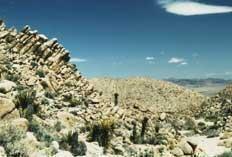Rodman Mountains Wilderness
Overview Colorful escarpments, white mountains splotched with red and black, a maze of canyons, and majestic bajadas come together in Rodman Mountains Wilderness. From northwest to southeast across the middle of the area, a large lava flow forms a long mesa that slices the terrain in two. More than a half-dozen natural tanks lie within the lava. Two of the tanks, named Hidden and Deep, contain thousands of gallons of water. Canyons with nearly vertical walls form deep drainage channels that cascade with water during desert storms. Faults created the valleys and ridges that play over the eastern and western portions of the area. Seven-mile Box Canyon is a non-Wilderness swath through the eastern portion, separating a small, far-eastern section from the rest of the Wilderness. The Rodman Mountains are one of only seven core breeding areas for raptors in the California Desert, and golden eagles and prairie falcons thrive here. Bighorn sheep have not been spotted in these mountains, but they have been seen in Newberry Mountains Wilderness to the west. For more information about this wilderness, please visit Wilderness Connect. Leave No Trace How to follow the seven standard Leave No Trace principles differs in different parts of the country (desert vs. Rocky Mountains). For more information on any of the principles listed below, please visit Leave No Trace, Visit the Leave No Trace, Inc. website.. Plan Ahead and Prepare Travel and Camp on Durable Surfaces Dispose of Waste Properly Leave What You Find Minimize Campfire Impacts Respect Wildlife Be Considerate of Other Visitors Rules and Regulations Motorized equipment and equipment used for mechanical transport are generally prohibited on all federal lands designated as wilderness. This includes the use of motor vehicles (including OHVs), motorboats, motorized equipment, bicycles, hang gliders, wagons, carts, portage wheels, and the landing of aircraft including helicopters, unless provided for in specific legislation. In a few areas some exceptions allowing the use of motorized equipment or mechanical transport are described in the special regulations in effect for a specific area. Contact the agency for more information about regulations.
Google Map: https://bit.ly/2M4nanP.
